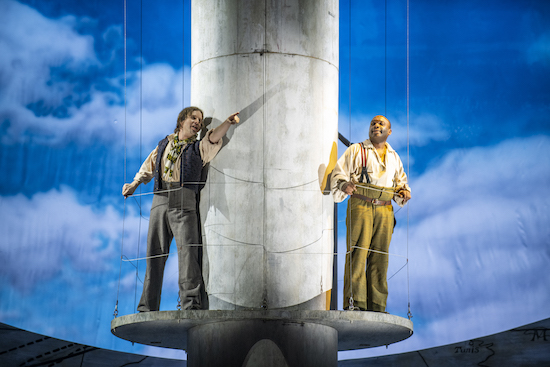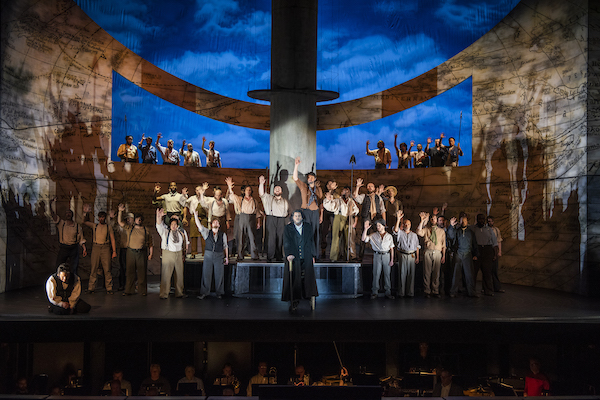COT wraps season in epic fashion with Heggie’s majestic “Moby-Dick”
Yes, it really is that magnificent.
Moby-Dick finally weighed anchor in Chicago Thursday night nearly a decade after it opened to audience enthusiasm and critical raves at Dallas Opera.
One cannot give enough praise to Chicago Opera Theater for bringing Jake Heggie’s opera to local audiences at last. Moby-Dick is easily the finest America opera of the past 50 years, as was demonstrated once again in COT’s majestic performance at the Harris Theater. There is only one repeat, so grab a ticket for Sunday’s matinee and go.
Beloved, feared and loathed by undergraduate English majors for the past century and a-half, Herman Melville’s sprawling 1851 novel remains a singular achievement in American literature. Not just for the exciting surface narrative of Captain Ahab’s vengeful pursuit of the title massive white whale that took off his leg, but for the epic cosmology of the piece—incorporating themes of religion and blasphemy, madness, superstition, and the natural (and unnatural) order of the universe.
Gene Scheer’s libretto masterfully distills everything essential from the novel into a tight and unified narrative. And Jake Heggie’s music remains a stunning achievement—roiling and powerful, scored with ingenuity and audacity, painting the briny sea and roaring storms as surely and confidently as the spare, lonely winds solos that reflect Ahab’s mounting madness and the characters’ moments of intimacy and homesick nostalgia.
Heggie’s opera benefited from being launched with a spectacular production, and that well-traveled Dallas staging became so inextricably linked with Moby-Dick that some wondered if the piece would make as strong an impact without the eye-popping visuals and projections.
Not to worry. COT’s production, which originated at Utah Opera, doesn’t offer the scenic thrills of that original staging. But in its more modestly scaled and functional way, the current production is highly effective on its own terms and serves the opera very well indeed.
If anything, Erhard Rom’s striking unit set, with a central mast pillar and revolving circular platform, makes Moby-Dick into a more intimate piece, throwing the spotlight on the many characters aboard the Pequod and their relationships and interactions. And, on a practical basis, the staging is one that will travel well, putting Moby-Dick into the purview of many smaller and regional companies, which will give Heggie’s opera more of the distribution and exposure it richly deserves.
Heggie wrote the central role of Captain Ahab for a Heldentenor and that’s the kind of voice that has tackled this demanding part, with Ben Heppner creating the role at the Dallas premiere in 2010, followed by Jay Hunter Morris in San Francisco.
Richard Cox, COT’s Ahab, doesn’t possess quite that kind of Wagnerian heft. At dramatic climaxes—the storm scene, the final confrontation with the massive title whale—one wanted greater volume, as well as more of a sense of the unbridled obsessive madness that drives Ahab in pursuit of Moby-Dick, even to the destruction of his ship, his crew and himself.
Yet if a bit of a vocal middle-weight for the role, Cox largely proved a superb Ahab in nearly every other respect. The Tennessee-born tenor brought a towering stage presence to the role, was forceful and affecting in his first act aria, scarily intense in his confrontation with Starbuck, and rose to his final scene with ample dramatic impact. Cox also presented a nicely rounded anti-hero, bringing searching expression to the captain’s moments of soliloquy and even a homesick nostalgia in his duet with Starbuck. The tenor also showed game theatrical stamina, hobbling around on a peg leg for the nearly three-hour evening.
Leading the rest of the large, nearly all-male cast, Andrew Bidlack was an aptly youthful naif as Greenhorn, the rootless Everyman protagonist who joins up with Ahab and the veteran Pequod crew. If his lightish tenor seemed stretched in some of his uppermost passages, Bidlack sang with vibrancy and sweet tone in his spotlit moments.
Alexey Bogdanov brought a huge baritone to the proceedings in the role of Starbuck. In addition to imposing vocal muscle and crystal-clear diction, the Ukrainian singer etched a compelling portrait of the ship’s first mate—a Christian family man caught between his sense of duty to the ship’s mission and obedience to his increasingly unhinged captain.
COT regular Vince Wallace proved ideal as Queequeg, offering an amiable likability and understated dignity as the island harpooner who befriends Greenhorn.
The only doubtful casting came in the opera’s sole female role, that of Pip. Wholly unbelievable physically in the trousers role of the cabin boy, Summer Hassan arighted the balance by singing with high, pure tone throughout. Still, she needed to bring more otherworldly expression to Pip’s near-drowning and more credible acting to his ensuing mental decline.
Christopher Magiera displayed an imposing tenor and brought an unsettling quality to his ominous offstage appearances as Captain Gardiner.
Company regular David Govertsen had to bow out of the role of Stubb due to laryngitis. Nicholas Ward proved a fine Stubb sub, lively in his capering dance moves and singing of his sea shanty. Filling out the large Pequod crew were worthy performances by Aaron Short as Flask, Joachim Luis as Tashtego, Keanon Kyles as Dagoo, and Aaron Wardell and Justin Berkowitz as the Spanish and Nantucket Sailors, respectively.
Director Kristine McIntyre capably moved the principals and blocked the complex action and swift-changing scenes on and around Rom’s mutable-functional set. Less consistent was the handling of the crew and seamen supernumeraries, with too many easy-lame unison movements. Worse, inserting pirouetting dancers among the crew veered toward camp, with a few of the choruses looking like something out of The Boys from Syracuse.
In only her second assignment since becoming COT music director, Lidiya Yankovskaya built on her strong debut last November leading Tchaikovsky’s Iolanta. She kept the momentum surging through the two long acts, balancing the principals, chorus and large orchestra with consummate skill and putting across all of the ingenuity, audacity and startling beauty of Heggie’s remarkable score.
Moby-Dick will be repeated 3 p.m. Sunday at the Harris Theater. chicagoperatheater.org
Posted in Performances





